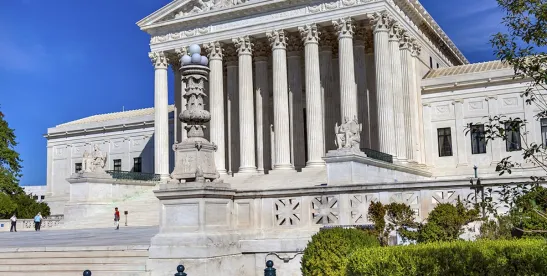On June 27, 2024, the U.S. Supreme Court dismissed Idaho v. United States on procedural grounds and sent the case back to the Ninth Circuit. By doing so, the Supreme Court reinstated the preliminary injunction issued by the district court and temporarily allows abortions to be performed when necessary to preserve the health of the pregnant woman. Mike Moyle, et al., v. United States, No. 23-726, and Idaho v. United States, No. 23-727. However, by failing to rule on the merits of the case and the core question of whether the Emergency Medical Treatment and Labor Act (EMTALA) preempts Idaho law, confusion and uncertainty are likely to continue for healthcare providers and hospitals seeking to provide care for pregnant women.
The History
This case is emblematic of the tension between EMTALA and state bans on abortions. As Sheppard Mullin has previously highlighted in our blog posts located here and here, EMTALA has received renewed focus at both the state and federal level after the Dobbs decision. Dobbs v. Jackson Women’s Health Organization, No. 19-1392 (2022). EMTALA requires hospitals with emergency departments participating in the Centers for Medicare and Medicaid Services (CMS) programs to provide medical screening and stabilizing treatment or transfer for patients with emergency medical conditions and women in labor. In July 2022, the Department of Health and Human Services (HHS) reaffirmed EMTALA and its requirement to offer stabilizing treatment that may require an abortion to be provided. Additionally, both HHS’ guidance and Secretary Becerra’s July 2022 letter to healthcare providers explicitly stated that EMTALA preempts state laws, and state laws or mandates that employ a more restrictive definition of an emergency medical condition are preempted by the EMTALA statute.
After the Dobbs decision, Idaho enacted an abortion ban which prohibited all abortions except when “necessary to prevent the death of the pregnant woman.” Idaho Code §18-622. In August 2022, the Department of Justice sued Idaho alleging violation of EMTALA under its abortion law, and the federal District Court of Idaho entered a preliminary injunction that prohibited Idaho from enforcing its abortion ban to the extent it conflicted with EMTALA requirements and EMTALA-mandated medical care. Idaho appealed to the Ninth Circuit, which initially lifted the preliminary injunction, but then restored it. Idaho sought immediate relief from the U.S. Supreme Court, which granted Idaho’s request to hear the case and temporarily put the federal district court’s ruling on hold.
Moving Forward
By ruling on procedural grounds rather than on the merits, it is likely that this issue will continue to be litigated and escalated to the U.S. Supreme Court again in the future. In a similar case involving preemption of state law in Texas, the U.S. government has petitioned the U.S. Supreme Court for review. As Justice Jackson noted in her Moyle opinion, “this pre-emption issue is not going away anytime soon and will most certainly return to this Court.” In the meantime, the U.S. Supreme Court’s decision continues to leave hospitals and healthcare providers in a precarious limbo as they try to navigate complex and conflicting state and federal laws. Shortly after the Moyle decision, the Biden Administration issued a statement to hospitals and providers reminding them of their duties under EMTALA. CMS also announced its continued investigations and enforcement of EMTALA obligations.
The law, policy and regulatory climate surrounding the Dobbs decision is complex and quickly developing. The information included in this article is current as of writing, but it does not address all potential legal issues or jurisdictional differences, and the information presented may no longer be current. Readers should consult counsel regarding their specific situation.



 />i
/>i

